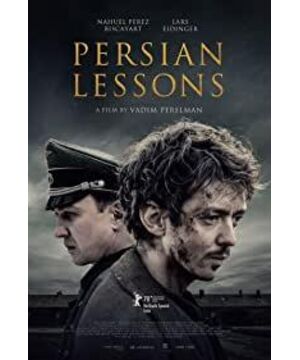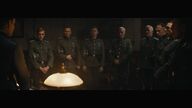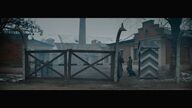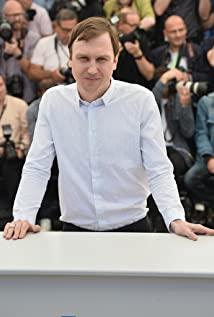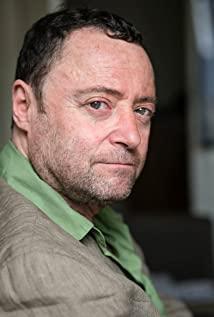The film created a new language: Fake Persian. Language is used for communication. As long as this function can be achieved, the connotation of the language itself does not seem to be that important, and the specific language used is not so important. Fake Persian is Gilles' secret to survival. In the beginning, it is also difficult to just repeat a few words, which requires constant repetition and memorization. Later, he thought of naming the prisoners after the prisoners, and assigning words according to their expressions and states. When he got here, he was no longer making things up, just telling what he saw and heard in a language that didn't exist. This movie creates a new language: false Persian. Language is used to communicate. But the meaning of language and the kind of language are no longer of great importance when communication can be achieved. Persian is the weapon of Gilles to survive. At first, it was difficult for him to remember only several words , which needed to be remembered repeatedly. Then, he found that he could apply prisoners' names to make of up false language, and their expressions and conditions empowered new meaning to language. Until this moment , he no longer made of with no logic, but used an inexistent language to describe what he heard and saw. Character names, images and his own feelings for these people can be matched one by one. I believe that when he compiled it, he only knew that this was his way of survival and the only thing he could do for this group of people. When he asked for their names, he reminded the group that they were not just numbers without meaning to life. Until the end, when Gilles said 2840 names, everyone was shocked, not because of his strong memory, but because of his awe and regret for each and every fresh life. Prisoners' names ,figures and Gilles' emotions could be linked one by one. I believe that he knew this is the way to survive for him and the only thing he could do for these people when he made of up false language. He asked the names of these people, which awoke them that they were not numbers with no life meanings. At the end of the movie, Gilles spelled out 2840 names , which shocked all people, not because of his powerful memory, but because of awe and pity for every living life killed in concentration camps. Nazi officer Klaus, in my opinion, is not a complete criminal Nazi, on the contrary, I see his yearning and pursuit for a better life in him. The few scenes in the film express his irritability and cruelty, and it is these subtle details that some believe show the cruelty of his heart. But I think in such an environment, it is normal for his emotions to be out of control, because he is just a normal person. It is precisely because of his location and environment that I want to praise the pure land in his heart: the seriousness in learning Persian late at night, the desolation in his heart when he talks about his life experience, the twinkling in his eyes when he asks "I love you". Love, has been protecting Gilles and keeping his promise to him, proudly speaking fake Persian as he boarded the plane. Klaus, a gGreman Nazi military officer, in my view, was not an absolute cruel Nazi. Instead., I see his love and pursuit for a happy life from him. Few scenes showed his cruelty and anger, and some one take these details as cruelty in his heart.I don't think so.In that environment,it is normal to lose control of his emotions ,because he is just a normal person.As for his status and environment,I want to praise the purity in his heart :he carefully learned Persian in the night;he expressed inner loneliness when his life experience was raised;his love sparked when he asked Giles how to speak say “I love you”; he protected Gilles and realized his commitment to Gilles; he proudly speak spoke false Persian when he was prepared for boarding. There isn't much in the film showing how the Jews were killed, only a few scenes, except for the Plus, Klaus is the biggest tragedy in the entire movie. Because Persian is fake, his serious learning is funny; when Gilles says leaves and bread are a word, his anger and irritability are foreshadowed, and he shouts fake Persian at the end. sharp contrast. This is like using a sarcastic way of writing. Taking Klaus as an example, it reflects that those who destroy the good life of others will eventually not deserve to have a good life: he thinks that he is not a sin, but a temporary puppet. You can live a normal life as if none of this happened. However, when he chooses to do this, he can never be innocent. There are few plots showing how Jews were killed .In addition to Jews,Klaus is the most tragic person.Persian is false ,so it is funny when he carefully learned learns.When he knew that “leaves” and “bread” shared the same word, he is angry and irritable, which set a stage for the performance in the future. Anger is a sharp contrast to loudly false Persian shouted by him in the ending. This seems that a kind of sarcastic writing was applied: Klaus is an representative role that people who destroyed others' happy lives will never enjoy a truly happy life. In his opinion, he was not evil enough that he could lead a normal life with a belief that nothing had happened. But he will never be innocent when he chooses to do this thing. After reading some other film reviews, there is one point of view that deeply attracted me: on the one hand, there is a full person who is full of yearning for a better life and can write hopeful poetry, On one side are the numb people who ruthlessly and mechanically slaughter innocent people. That film review explored the role of art in people. What I want to say is: what is the relationship between thought and action? Is this the complexity of human beings? Is it the duality of man? Can you do two opposite things in order to survive? If the ideals and beliefs in the heart do not guide their behavior, can they still be called beliefs? I am expressed by opinions from another film review: He can be a full man who pursue a happy life and writes a poem about hope, but he can be a numb machine who relentlessly kills innocent people. That film review discusses how arts function on people .What I want to doubt is : what is the relationship between minds and actions?Is this the complexity of people's natures?Is Are the the two sides of a person?Can he do the opposite things for survival?Can it be called belief if belief in the heart can not guide one's own behaviour? I burst into tears when Gilles finally pronounced the names of 2840 people. Because Gilles unintentionally did a great thing, he not only saved his own life, he also exposed the truth to the world, and he made the unknown people who were killed live forever. Also, at that moment, I really realized the connotation of the name. It is just a label, but it is the business card for each of us to live and survive. The scene of the name being pronounced at the end of the movie lasted for a long time. When each name was pronounced, Gilles' eyes showed each of them, and all the people in the world will know this group of people with names and families. was mercilessly killed. The movie restores the historical facts at that time, and we need to reflect on it. More importantly, we should not only comment on or criticize the past, we should reflect on the present and the future, so that the tragedy will not repeat itself, let us who live in a peaceful and prosperous world cherish the happy life of today, and we must understand what is not acceptable. . At last, Gilles spelled out 2840 names , which attracted my tears. He occasionally did a great job, a job that not only survived his own life , but survived the lives of anonymous people killed secretly. At that moment, I realize the meaning of names,
View more about Persian Lessons reviews


